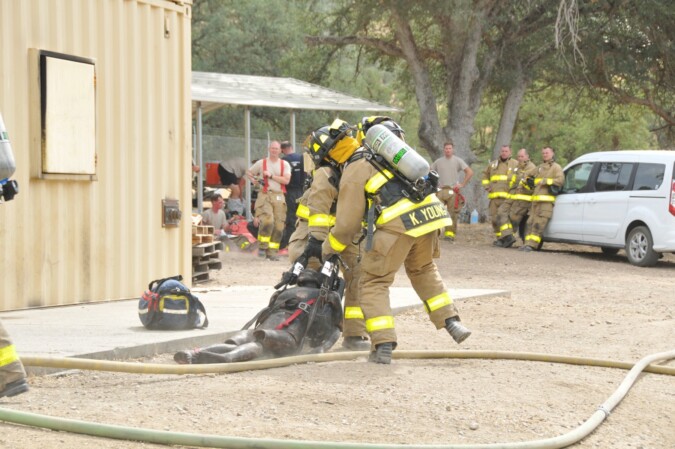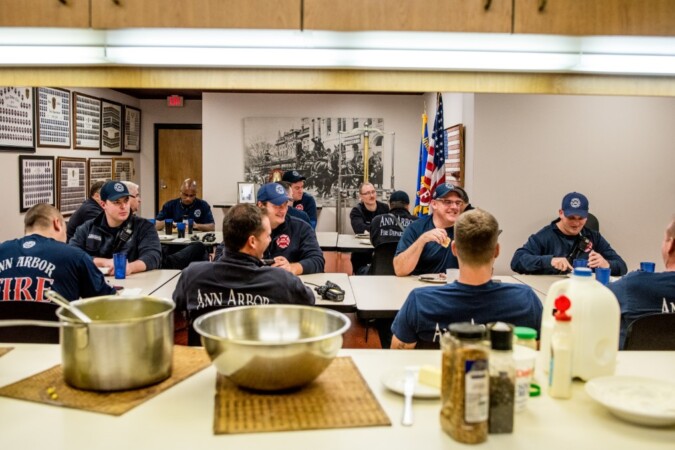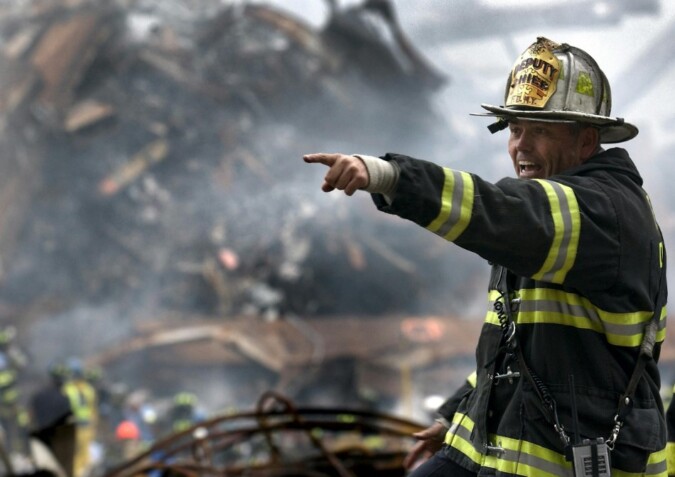As a firefighter, you are an absolute hero—no doubt about it. You charge into burning buildings, save lives, and handle emergencies most people wouldn’t dream of facing.
While the job comes with a massive adrenaline rush, it also comes with some serious health risks. Intense physical exertion, exposure to toxins, and high stress combined with erratic sleep patterns can take a serious toll on long-term health.
The good news? A few key habits can help you reduce the risk of chronic health problems and stay strong, both on and off the job. What are they? We’ll discuss them here.
1. Train Smart, Not Just Hard

You need strength and endurance to handle the demands of the job. But just lifting heavy or running fast until you drop won’t help build strength and endurance.
For firefighters, it’s important to train in a way that prevents injuries and builds functional strength. You have to carry people, pull hoses, and climb ladders. That means you must prioritize movements like deadlifts, squats, and loaded carries.
Work on mobility and flexibility as well. Stiff joints and tight muscles can increase your chances of getting hurt. Add in stretching, foam rolling, and yoga to stay loose and injury-free.
Don’t skip aerobic exercise, also known as cardio. It helps keep your heart strong. Try activities like running, biking, swimming, or using a stair climber.
According to the Mayo Clinic, it can increase stamina and reduce fatigue. Over time, you’ll experience enhanced heart and lung function, alongside stronger bones and muscles.
Train consistently, but don’t push yourself too hard, especially when you’re fatigued.
2. Wear Your Gear Even During Overhaul
Even after the flames are out, the danger isn’t over. Smoke and debris contain harmful toxins and carcinogens. These invisible hazards can increase your risk of cancer and respiratory problems.
Keep your SCBA and full turnout gear on during the overhaul. Your gear acts as a shield against these hidden dangers. Don’t let your guard down just because the fire is out. These toxins can still be present in the air and on surfaces.
PFAS (per- and polyfluoroalkyl substances) is an example. These chemicals, also known as forever chemicals, are present during overhaul operations after fires due to their use in firefighting foams.
Aqueous film-forming foam, or AFFF, specifically, contains PFAS. These man-made chemicals don’t break down easily. Instead, they linger in the air, soak into debris, and even cling to your gear.
TruLaw reports that exposure to PFAS has been linked to several types of cancer. They include the bladder, colon, liver, pancreas, thyroid, and testicular cancer.
Firefighters and military personnel are filing the AFFF lawsuit, alleging that the manufacturers knew of the risks but failed to warn users about them. Notable defendants include The Chemours Company, 3M Company, Tyco Fire Products, and DuPont.
3. Fuel Your Body Like a Pro Athlete

Firefighting can burn up to 6,000 calories a day. That’s like running multiple marathons in a week. The U.S. Department of Agriculture Forest Service warns that insufficient calorie intake will put you at risk of fatigue and weight and muscle loss.
Too many firefighters survive on gas station snacks, fast food, and caffeine to power through shifts. But over time, it will impair your immune function and lead to illnesses.
A good diet helps keep you healthy and ready for the next call. After a demanding day, your muscles need to recover. Protein helps do that. Meat, eggs, fish, beans, and nuts are excellent sources of protein.
Carbohydrates are your main energy source. Good sources include whole grains, beans, rice, fruits, and veggies.
Don’t forget about healthy fats. They give you energy and help your body absorb vitamins. Nuts, avocados, and olive oil are excellent sources of healthy fats.
4. Get Enough Sleep
Firefighters don’t exactly have the luxury of a solid eight hours every night. Their sleep schedule is a mess because of long shifts and interruptions, says Firefighter Nation.
But lack of sleep can increase your risk of serious health problems like cancer and heart problems. Chronic sleep deprivation can also contribute to mental health struggles like depression.
On the ground, you need to be sharp and focused. Sleep deprivation can impair your cognitive functions, increasing the risk of errors in critical situations.
So, prioritize sleep. Try to stick to a regular sleep schedule as much as possible, even on your days off. Don’t consume caffeine or alcohol near bedtime, as they can disrupt your sleep.
Control your sleep environment. Make your bedroom dark, cool, and quiet. Practice relaxation techniques like deep breathing or meditation before you go to bed.
5. Keep an Eye on Your Heart Health

Your heart takes a beating in this job.
It’s not surprising then that firefighters are at a higher risk for cardiovascular problems, including heart attacks and sudden cardiac events. In 2022, around 73% of firefighters’ deaths were caused by heart attack or stroke.
The job itself contributes to this risk. Disrupted sleep, stress, tough calls, and smoke exposure along with poor diet and lack of exercise, play a big role.
Intense physical exertion during calls pushes your system hard. If you already have underlying issues, this can trigger a cardiac event.
The good news? Most cardiovascular diseases are preventable. Know your numbers. Get regular check-ups to monitor blood pressure and cholesterol. Follow department fitness standards if they exist.
Make lifestyle changes. Focus on a healthy diet, like the Mediterranean style. It’s high in vegetables, fruits, nuts, whole grains, seeds, and beans. Research shows that the cholesterol profiles of firefighters who follow this diet are more favorable than those who don’t.
Avoid smoking and limit alcohol as well. These are two major causes of cardiovascular diseases. Even cigarettes with lower levels of nicotine and tar increase the risk of heart and blood vessel issues.
Firefighting is tough on the body and mind. But you don’t have to accept chronic illness as part of the job. Developing these four habits can drastically reduce your long-term health risks. And you can effectively serve your community for years to come.





